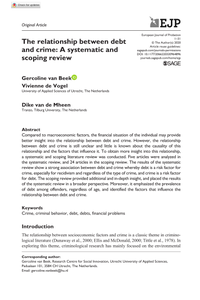Although studies point to a relationship between debt and crime, there is a limited understanding of their reciprocal relationship and possible mediating risk factors. Moreover, knowledge about the prevalence and scope of debt among offenders is lacking. Therefore, the present study analyzed 250 client files including risk assessment data from the Dutch probation service on the prevalence of debt and possibly related risk factors. The results show that debt is highly prevalent and complex, which underlines the importance of acquiring more knowledge about debt as a potential risk factor for relapse during supervision. It was found that problems with regard to childhood and living situation, education and work/daytime activities, and mental and physical health may be possible underlying risk factors in the relationship between debt and crime. These insights can help professionals adequately support clients with regard to debt in order to prevent recidivism. debt and crime. These insights can help professionals adequately support clients with regard to debt in order to prevent recidivism.
MULTIFILE

Although studies point to a relationship between debt and crime, there is a limited understanding of their reciprocal relationship and possible mediating risk factors. Moreover, knowledge about the prevalence and scope of debt among offenders is lacking. Therefore, the present study analyzed 250 client files including risk assessment data from the Dutch probation service on the prevalence of debt and possibly related risk factors. The results show that debt is highly prevalent and complex, which underlines the importance of acquiring more knowledge about debt as a potential risk factor for relapse during supervision. It was found that problems with regard to childhood and living situation, education and work/daytime activities, and mental and physical health may be possible underlying risk factors in the relationship between debt and crime. These insights can help professionals adequately support clients with regard to debt in order to prevent recidivism
MULTIFILE

Compared to macroeconomic factors, the financial situation of the individual may provide better insight into the relationship between debt and crime. However, the relationship between debt and crime is still unclear and little is known about the causality of this relationship and the factors that influence it. To obtain more insight into this relationship, a systematic and scoping literature review was conducted. Five articles were analyzed in the systematic review, and 24 articles in the scoping review. The results of the systematic review show a strong association between debt and crime whereby debt is a risk factor for crime, especially for recidivism and regardless of the type of crime, and crime is a risk factor for debt. The scoping review provided additional and in-depth insight, and placed the results of the systematic review in a broader perspective. Moreover, it emphasized the prevalence of debt among offenders, regardless of age, and identified the factors that influence the relationship between debt and crime.
DOCUMENT
